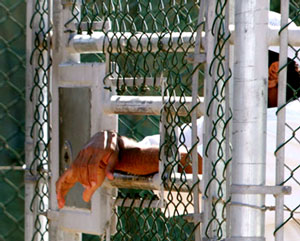- Report: European nations complicit in CIA abductions, secret prisons (Al Jazeera, 06-07-2006)
- Amnesty: Guantanamo ‘the gulag of our time’ (FCN, 06-08-2005)
- Carter: Guantanamo Prison Camp, an Embarassment for U.S. (Prensa Latina, 06-08-2005)
- Farrakhan calls for delegation to be sent to Guantanamo (FCN, 05-25-2005)

NEW YORK (IPS/GIN) – Human rights organizations here are hailing recommendations by the United Nations Committee Against Torture that the United States close its Guantanamo Bay, Cuba, detention center, cease holding detainees in secret prisons, and stop the practice of “rendering” prisoners to countries where they are likely to be tortured.
The committee, a panel of 10 independent experts, is the UN body that monitors compliance with the world’s anti-torture treaty. It recently concluded two days of hearings in Geneva, Switzerland, where a 26-member U.S. delegation defended Washington’s treatment of prisoners and emphasized its prosecutions of those guilty of abuse.
The committee periodically reviews each of the 141 countries that have ratified the Convention against Torture (CAT). In previous years, the committee has criticized abusive interrogation techniques and secret or indefinite detention by countries ranging from Sweden to Saudi Arabia.
Reed Brody, special counsel for Human Rights Watch (HRW), told IPS, “The United States would do well to heed what all its friends and every independent body are saying. It’s time to put the rule of law into the fight against terrorism.”
Gabor Rona, international legal director for Human Rights First, told IPS, “What is most striking is how severely U.S. detention and interrogation policies and practices have damaged efforts to protect human rights around the world.”
The UN committee’s report demanded that the U.S. close its prison at Guantanamo Bay and said detainees should not be returned to any country where they could face a “real risk” of being tortured. The committee said it was worried that detainees were being held for protracted periods with insufficient legal safeguards and without judicial assessment of the justification for their detention.
The U.S. military recently announced that four inmates at the Guantanamo detention center tried to commit suicide and other inmates there attacked guards trying to prevent one man from hanging himself, according to news reports.
The committee also expressed concern about allegations that the U.S. has established secret prisons and that the International Committee of the Red Cross does not have access to the detainees. The United States “should ensure that no one is detained in any secret detention facility under its de facto effective control,” the report said.
It also said the U.S. “should rescind any interrogation technique including methods involving sexual humiliation, ‘water boarding,’ ‘short shackling’ and using dogs to induce fear–that constitute torture or cruel, inhumane or degrading treatment or punishment, in all places of detention under its de facto effective control.”
Water boarding is a controversial technique in which a subject is made to think he is drowning. Short shackling involves shackling a detainee to a hook in the floor to limit movement.
The UN report said some interrogation techniques “have resulted in the death of some detainees during interrogation” and criticized “vague U.S. guidelines” that “have led to serious abuse of detainees.”
The panel asked the United States to report back within a year with its response to several of its concerns and recommendations. Members also referred to a report by investigators for the European Parliament who claim to have evidence that the CIA has flown 1,000 undeclared flights over Europe since 2001, in some cases transporting terrorist suspects abducted within the European Union to countries known to use torture.
The CAT committee’s report is the second UN report in recent months. An earlier report by the now-defunct UN Commission on Human Rights concluded that U.S. treatment of Guantanamo Bay detainees violates their rights to physical and mental health and, in some cases, constitutes torture.
The U.S. recently announced plans to release about a third of those still detained on grounds that they no longer pose a threat to the U.S. and have no further intelligence value. The Pentagon also recently published its first complete list of the detainees’ names.












